SECTIONS
What is Autism Spectrum Disorder?
Characteristics
Events
Evaluation
Causes
Epidemology
Is autism handicap
management
What is Autism Spectrum Disorder (ASD)?
Autism spectrum disorder is part of the set of neurodevelopmental disorders described in the DSM-V. It is characterized by significant difficulties in two areas: communication and social interactions, and restricted or repetitive behaviors, activities and interests.
Autism Spectrum Disorder is usually present in early childhood, but may appear more prominently at the time of entry to school. It is a state that manifests itself differently among people.

The ASD is the name that replaces pervasive developmental disorders since 2013.
Characteristics
Autism Spectrum Disorder is characterized by significant difficulties in two areas:
1. Communication and social interactions,
2. Restricted or repetitive behaviors, activities, and interests.
The clinical picture can vary greatly from one person to another.
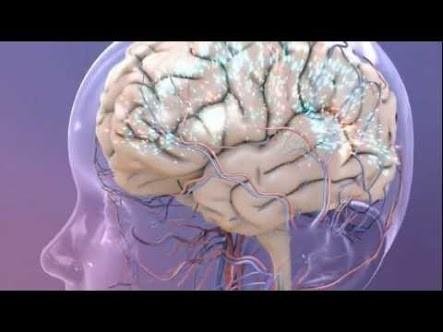
Each has a unique combination of signs and symptoms. The degree of impairment is different according to age, cognitive and behavioral characteristics and the presence of associated conditions. Events can also change over time. People with autism represent such a heterogeneous group that it is often said that there is as much autism as people with autism.
Communication and social interactions
There are persistent difficulties of absence or lack of social reciprocity. Between not paying attention to each other and not knowing how to initiate an interaction, multiple manifestations are possible. Difficulties are also present in nonverbal communication. For example, it is often complex for an autistic person to understand what is implied in the intonation used by the interlocutor or in his raised eyebrows. Moreover, the implicit rules of social interactions are not instinctively acquired, social relations may not be appropriate for the age of the person.
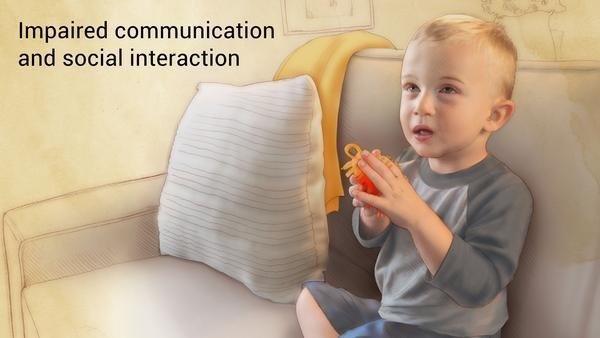
Behaviors, activities and interests restricted or repetitive.
In some people with autism, it can be seen that the interests may be few, but very developed. One often notices repetitive activities or behaviors such as strange manipulation of objects (aligning or twirling them), unusual movements of the body (swaying, twisting or clapping), and so on. Changes can cause significant distress accompanied by often sudden and excessive emotional reactions. Repetitive activities have a reassuring effect because of their familiarity.
In the autism spectrum disorder, the symptoms represent a continuum that ranges from mild to severe. The degree of severity, specifies the need for support of the person and has three levels which is as follows:
1. Requires support
2. Requires significant support
3. Requires very important support
Symptoms must be present since early childhood, but they can also be fully manifested with increasing social demands. They limit and alter daily functioning.
This classification model makes it possible to have a more accurate portrait of the person with autism and to make a more precise diagnosis. By stating the difficulties of the person and identifying their needs, service responses should be more functional.
Events
Some clues may arise and prompt an evaluation. Those who are identified with autism are present at an early age between 1 and 2 years old with this sign
• do not babble, do not point or do not communicate at 1 year
• do not answer the call of their name
• sometimes seems to be deaf
• does not try to imitate
• seldom makes eye contact
• does not smile
• does not show objects to others
• loses language or social skills
• makes difficult contact with others others, seems indifferent to others
• seems to prefer to be alone
• does not ask for help directly
• resists petting
• bursts out laughing for no apparent reason
• cracks tears, tantrums or becomes distraught without knowing why
• resists routine changes
• is fascinated by spinning objects
• indulges in obsessive games (eg alignment of objects) or repetitive
• does not seem to know how to play with toys
• does not fear the real dangers
• wears an excessive attachment to objects
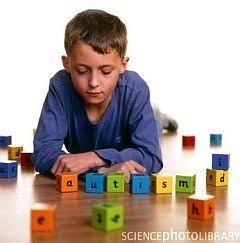
Evaluation
The evaluation tools used prior to the DSM-V are not comprehensive enough if used individually. The ADOS-2 is better suited, but the use of several tools is preferred. In all cases, you must also observe the person in different contexts.
The causes
To date, no single cause has been found for autism and it is likely that several different causes may lead to the development of signs of autism.
Current research strongly suggests that there are neurological and genetic bases. The idea that autism originated in parent-child relationship disorders must now be totally abandoned ( Autism Europe: People with Autism: Identification, Understanding, Intervention ).
The risk of developing autism does not depend on the social or educational level of the family or ethnicity.
Research on the causes of autism involves different scientific specialties and different approaches, which are probably complementary. Here is a brief overview of the main research trends:
Epidemiology
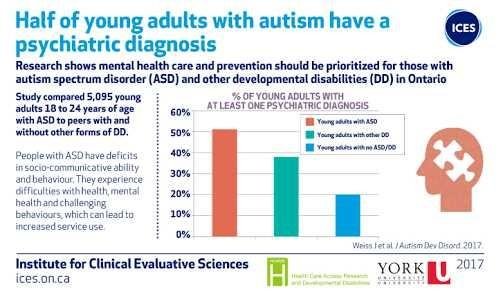
Since 2000-2001: annual increase of 23% Montreal, Laval, Laurentides and Montérégie have the highest prevalence rates (Noiseux 2008).
According to different studies, the prevalence rate varies from 1/100 to 1/88.
No prenatal test is available,Jo-Ann Lauzon, Quebec Autism Federation, July 28, 2014.
Is autism a handicap or a difference?
In the large community of autism, many ideas are the subject of polarized debates. As I am autistic, this kind of choice in black and white, where one must take a well-defined position, is appropriate for my neurology: I prefer well-defined questions to gray areas. But I also believe that with this kind of question, presented as a dichotomy, one is misled and forced to choose one side or another, while the truth is much more complex.
"Is autism a handicap or a difference? Is one of those questions. Indeed, the way the question is asked gives the impression that only one of these two answers can be right.
Autism is a "difference"
Many adults with autism would like to see autism recognized as a difference, rather than a disability. Most of these people are adults who have no difficulty walking or talking. We can leave home without help. Some of us have children. We are your friends, your neighbors and your colleagues. We seem a little odd, but we manage to adapt enough to at least get a place in society.
Despite this, it remains for us to evolve in society presents significant challenges. The sensory overload and the gaps in the neurological processing of information in our brain, as well as our ever-present challenges of communication and understanding of social conventions, are such important differences that even if we manage to manage them, we are usually exhausted at the end of the day.
Most of the time, when we are able to go out and function in the community (without the help of a paid person), it seems that society expects our appearance and behavior to be consistent with the standard standard, no matter the challenges that the neurological difference of autism imposes on us. As we are like others, our difficulties and needs are seen as personal problems. Even though we have been diagnosed with Autism Spectrum Disorder, which means in fact that we have significant difficulties in many areas, some people give us bad intentions and confuse the expression of our needs with personality defects. .
Autism is a "handicap"
For some of us, the way autism manifests itself in our body means that we have many obstacles to overcome daily and throughout our lives. We need communication support equipment, occupational therapy equipment and paid attendants to support our personal needs. For those of us who are experiencing such difficulties, it is easy to understand that in this respect, autism is a handicap.
Many of us need a paid person to come out of the house or help us communicate. Some need professional support 24 hours a day. Autism is clearly manifested in our body and is noticed by people when they meet us. When this is the case, everyone can clearly see that we need help. When autism is apparent, it is rare for people to judge us and attribute our difficulties to laziness, lack of motivation, egocentricity, or any other negative personality trait.
But when autism is apparent through its physical manifestations and corresponding support needs, people also draw other conclusions about us. Our needs are so obvious that others forget that we also have strengths and abilities, preferences and dislikes. Often, as adults, we are employed to do low-level work, or even deemed unable to work, and people hired to provide support services change regularly, as if they were interchangeable and interpersonal relationships had no value for us. We are rarely seen as full-fledged people with all that implies, that is, preferences, desires, abilities, abilities, and talents,
The trap of choosing between disability and difference
As an autistic person, when asked to choose one answer to autism - either a "disability" or a "difference" - I have the distinct impression that I am being asked what part of I choose to ignore myself. If I choose to refer to autism as a "disability" for me, it means that my talents, strengths, abilities, and preferences will be ignored. If I refer to autism as a "difference" then my difficulties and needs, though real, will be ignored. I will be regularly accused of being stubborn and not wanting to give up "character flaws" when I press for them.
Daring the middle way: both a handicap and a difference
What would happen if we chose to designate autism as both a disability and a difference? Would we be completely ignored, or supported perfectly? Here is another question posed according to a dichotomous model, which requires making an impossible choice!
In other words, when you think of autism as a handicap or a difference, you force yourself to make a choice that is not a choice. This choice is not beneficial to anyone and clearly gives poor results. And yet, we remain with this impression that we must choose between "handicap" and "difference". Why is that?
Management of autism
There is currently no treatment capable of curing autism, and it is very difficult not to get lost in the multiplicity of modes of care offered to address the difficulties of people with autism. Currently, only one article has validated the superiority of one treatment modality compared to another in the management of autistic persons .
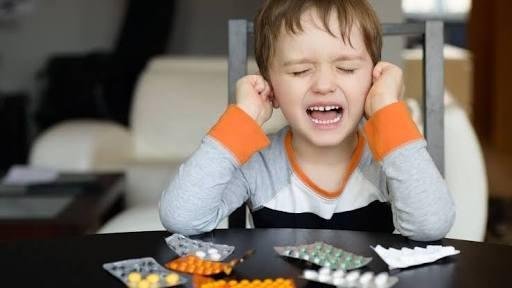
However, there is an agreement on the following points:
- It is currently recommended that the care of people with autism be based on three main components, the relative part of which should be adapted according to the characteristics of each person and its evolution (personalized project).
These three components are:
1. Educational, with the objective of subject autonomy
2. Pedagogical, with the aim of learning
3. Therapeutic, with the objective of the mental and physical health of the subject.
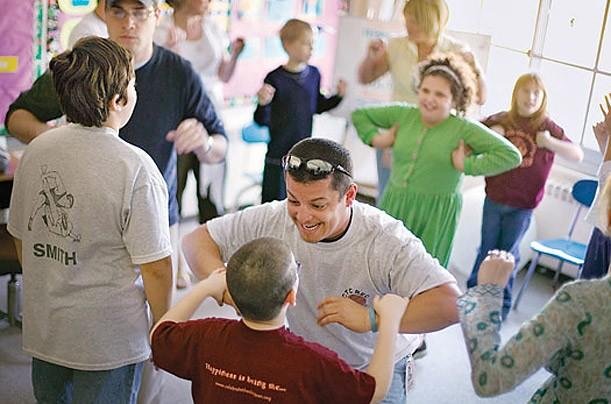
The interest of early treatment is recognized. However, it is important to know that an autistic person can continue to progress throughout his life, including as an adult.
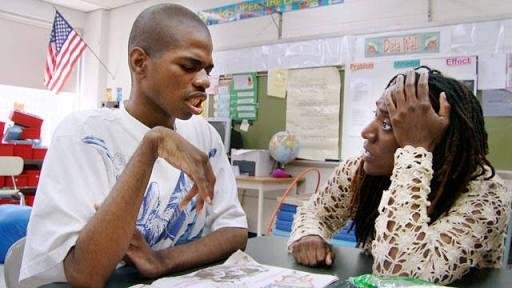
The care must be sufficiently intensive .
It must be individualized , that is to say adapted to the peculiarities of each person and regularly reevaluated according to the evolution.
There is therefore no management of autism but different modalities which may be more appropriate for some people, for certain difficulties, or at certain points in the evolution of the autistic person. Flexible models, open, coordinating several methods of care are preferred. The rules of common sense are also important (beware of techniques that exclude others or are too expensive).
The use of drugs may be indicated. It should be known that pharmacological treatments are always symptomatic that is to say they aim to reduce certain symptoms (such as agitation, anxiety, stereotypies or invasive rituals, sleep disorders ...), without treating the cause of autism. In general, these treatments are not devoid of side effects. In children very few have received the Marketing Authorization (Marketing Authorization). On the other hand, by relieving an embarrassing symptom or easing a period of crisis, they can have an indirect impact on learning, communication or socialization.
Always pay attention to physical health of the autistic person, whose somatic problems can be overshadowed by autistic symptomatology including communication and behavioral disorders.
Images sourced from google.com

I have a grandson who is autistic. He is 22 years old in January. We have a service dog for him to aid him while he is away from the house. He is a loveable young man with a keen sense of humour. He makes me very proud. There is no need to be afraid. Their minds are wired a little differently than ours. They have a difficult time in expressing feelings. They have a lot to offer if you give them a chance.
Downvoting a post can decrease pending rewards and make it less visible. Common reasons:
Submit
I am scared already
Downvoting a post can decrease pending rewards and make it less visible. Common reasons:
Submit
No.... there is really nothing to be scared of i have spent time with autism kids.
Downvoting a post can decrease pending rewards and make it less visible. Common reasons:
Submit
I just feel like getting scared ooo... A cup of water would do.
Downvoting a post can decrease pending rewards and make it less visible. Common reasons:
Submit
Hehe 🍷 here is a glass of wine this should do
Downvoting a post can decrease pending rewards and make it less visible. Common reasons:
Submit
Very informative. While a student pursuing a social worker degree many of the classes touched on autism. Many unconventional students were parents to autistic children. I was amazed how many lives are effected by it.
Downvoting a post can decrease pending rewards and make it less visible. Common reasons:
Submit
Well written and informative, as a father, words cannot describe the struggle other parents go through facing children with autism.
Downvoting a post can decrease pending rewards and make it less visible. Common reasons:
Submit
I have read clearly that your post is good and I like your post. @musamy have vote your post
Downvoting a post can decrease pending rewards and make it less visible. Common reasons:
Submit
@phunke, Thanks for sharing this information. I watched an India film about autism and my dear, it was so touching. This kind of children need a lot of attention and their parents are trying.
@seyiodus.
Downvoting a post can decrease pending rewards and make it less visible. Common reasons:
Submit
@cryptohustlin has voted on behalf of @minnowpond.
If you would like to recieve upvotes from minnowponds team on all your posts, simply FOLLOW @minnowpond.
Downvoting a post can decrease pending rewards and make it less visible. Common reasons:
Submit
Great information. I know of so many families with autistic kids. #steemitbloggers support
Downvoting a post can decrease pending rewards and make it less visible. Common reasons:
Submit
Support is really important for family members. I know a marriage that did not work out because 1st baby was autistic
Downvoting a post can decrease pending rewards and make it less visible. Common reasons:
Submit
Nice post... quite educating. I hope you follow back and upvote my posts
Downvoting a post can decrease pending rewards and make it less visible. Common reasons:
Submit
@royrodgers has voted on behalf of @minnowpond.
If you would like to recieve upvotes from minnowponds team on all your posts, simply FOLLOW @minnowpond.
Downvoting a post can decrease pending rewards and make it less visible. Common reasons:
Submit
@eileenbeach has voted on behalf of @minnowpond.
If you would like to recieve upvotes from minnowponds team on all your posts, simply FOLLOW @minnowpond.
Downvoting a post can decrease pending rewards and make it less visible. Common reasons:
Submit
Mehn, this one is strong oh.. How did you come across this? May God help us oh... It must be really hard taking care of them....
Downvoting a post can decrease pending rewards and make it less visible. Common reasons:
Submit